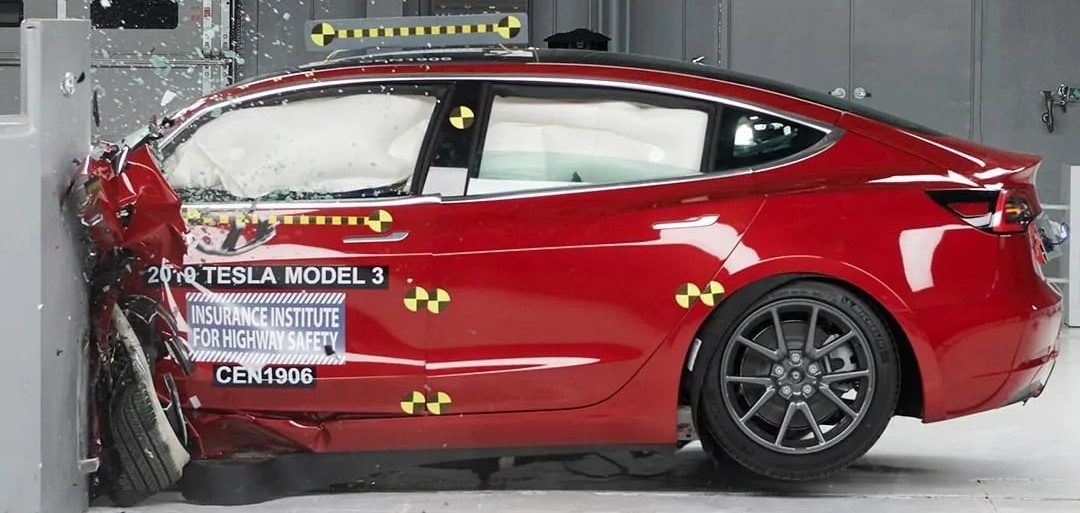Tesla Model 3 has earned the 2019 IIHS Top Safety Pick award in the USA
From Tesla comes this story and video of the IIHS Crash test of a 2019 Model 3. IIHS is the comparable body to our ANCAP testing regime. This is the first crash test of a Model 3 that I’ve seen and I wanted to share it with you.
“We engineer our cars to be the best in the world – in every category. Model 3, our most affordable car yet, is no exception. From the start, we designed it to be among the safest cars ever built, with the goal of getting as many Model 3s on the road as possible to further our mission.
Model 3 has already earned a 5-star safety rating in every category and sub-category from safety authorities on three continents (North America, Europe and Australia), and it has received top marks around the world for its advanced safety assistance features like Automatic Emergency Braking.
Now, in new tests from the Insurance Institute for Highway Safety (IIHS), Model 3 has been named a 2019 IIHS TOP SAFETY PICK+ vehicle, the highest achievement awarded by the Institute. To evaluate whether Model 3 met the criteria for this top rating, IIHS tested the car’s crashworthiness, occupant protection, crash avoidance, and headlight systems. Model 3 earned top marks in all eight tests, including a superior rating in front crash prevention, which evaluates a car’s Automatic Emergency Braking system, and the highest possible rating in IIHS’ headlight assessment.
Here’s a look at some of the ways we made this happen:
Part of what makes Model 3 so safe is its all-electric powertrain design, which gives the car a low centre of gravity that reduces roll-over risk, as well as its rigid aluminium and steel passenger cabin that provides exceptional strength to equally protect drivers and passengers. Additionally, Model 3’s lack of an engine is replaced by a large crumple zone that helps it absorb energy more effectively than a gas car would, dissipating force away from the passenger cabin. This crumple zone contributed to Model 3’s top rating in IIHS’ frontal crash protection tests.
The Institute’s results also demonstrate the exceptional strength of Model 3’s all-glass roof, which is supported by a very strong metal body structure and helps protect occupants in roll-over crashes. During testing, the car’s roof was able to successfully resist more than 20,000 pounds of force – that’s more than if we placed five Model 3s on top of the car’s roof at once. And, the roof earned a higher strength-to-weight ratio score than any other fully electric vehicle that IIHS has ever tested.
In addition, Model 3’s safety restraint system also earned high marks in IIHS’ evaluation. This was due in part to Model 3’s seats, which are designed and manufactured in-house at our dedicated seat factory in Fremont, as well as our thick curtain airbag and uniquely shaped front passenger airbag, which help protect a passenger’s head from the car’s A-pillar and centre screen.
In terms of crash mitigation, good headlights can help prevent nighttime crashes, which is why Model 3 comes standard with automatic high and low beam headlights that earned top marks in IIHS testing. And, when it comes to crash prevention, Model 3 earned a superior rating thanks to our Automatic Emergency Braking system, which successfully avoided collisions at both 12 miles per hour and 25 miles per hour.
The safety of our customers is what matters most, which is why our active safety features and passive safety equipment come standard on all of our cars. We’re also committed to making our cars even safer over time via over-the-air updates, helping us ensure that all Tesla drivers have access to the best safety features available for their cars.
2 Star Rating for Great Wall Steed – Safety is More Important Than Price How Many Uber, Ola, and Didi Drivers Are in Recalled Cars?




